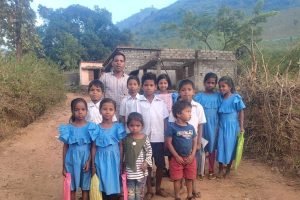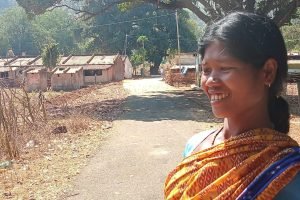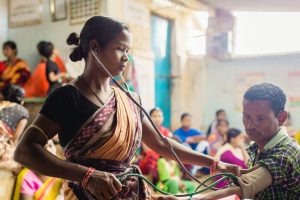Excerpt from the conversation with Paldei Majhi, TULSI Sathi
“A few years back, my friend Savitri* was married off to a boy from a nearby village. We were only 13 years old and it was within 2 months of commencement of her menstruation. The marriage ceremony was very huge and she was also very happy. She got pregnant within next few months and she gave birth to a baby boy. But during the delivery, the placenta did not come out and some other complication had happened. Even though the elders rushed her to a clinic and then a higher care hospital, she passed away in Burla Hospital. This was the first death of this kind in our village. I remember her face very vividly. We were very close friends. When I heard the news of her death, I felt very bad and devastated. Her body was fully puffed up. I was only 13 years then, I did not understand why she died even. The whole village was mourning her death for days”, recalls Paldei Majhi of Melghara village. As she narrates the incident, she mimics how her friend looked and her eyes teared up as she spoke.
It’s been 2 years since Paldei joined us as TULSI SATHI. It’s been a wonderful learning journey so far for her. She enjoys the training classes the most as she is able to understand more about her body, what changes happen to her body during menstruation, understand what food gives what kind of nutrition and learn some mathematics!
TULSI Sathis are village-level adolescent girls’ peer group educators who are trained every month on various themes like Sexual and Reproductive Health, gender equality, Nutrition, Life Skills, common health issues, Non-formal education, and Livelihood skills. Swasthya Swaraj works with adolescent girls as they are the important link towards improving the health and survival of the present and future community. Most of the TULSI Sathis are school dropouts or never been to school. They act as peer group educators who mobilize the adolescent girls from her village and impart training to the girls in the TULSI clubs twice a week in the evenings.
Paldei Majhi loves meeting the ‘didis’ of Swasthya Swaraj. In the beginning, she seemed to have struggled to take training to her own friends but she says that she mimics some training styles of the didis in her clubs. “To know so much about my body and to be able to teach my girls about it makes me feel empowered”, says Paldei while holding the hands of our TULSI coordinator. She adds that she seems to feel responsible for the girls of her village.
For Paldei, the story of Savitri is very relatable. It is the same for the girls of her village and hence it was easier for her to talk to the girls. She says that she is aware that a girl can be pregnant out of wedlock. Since all the girls in the village spend most of their time together, we are aware of each other’s personal matters and is aware of each other’s menstrual cycle. They speak about the ill effects of early marriage and the consequent early pregnancy, among themselves. They even speak of contraceptives in the groups. The group is very careful of any of the girls missing their date and they follow up.
“My girls tell me that they will marry only after 5/6 years after commencement of menstruation now”, adds Paldei Majhi. The TULSI group acts as a positive peer pressure in the village! Since the knowledge is with the adolescent girls themselves, it’s interesting to see how they make use of it to make informed decisions. The clubs are examples of how peer pressure can positively influence social change. Teenagers are more susceptible to the influence of their friends. While they are learning about their social place and their identity, they are subconsciously looking to their friends for information about how to act and interact with others. The TULSI Club acts as a social influencing platform to resist child marriages and grow up as empowered women.



